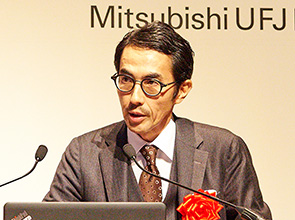Conference on Competitiveness
Message from Sponsor: "Moves employed by Japanese companies to enhance their corporate value--Utilizing U.S.-style tax-free spin-offs"
Mr. Haruo Nakamura, Deputy President, Mitsubishi UFJ Morgan Stanley Securities Co., Ltd.
 In recent years, Japanese companies have been implementing financial strategies that give priority to improving capital efficiency, while paying closer attention to the cost of capital.
In recent years, Japanese companies have been implementing financial strategies that give priority to improving capital efficiency, while paying closer attention to the cost of capital.Issuances of new shares and convertible bonds--at the 2.5 trillion yen level for the past 2 to 3 years--have decreased drastically to an annualized amount of 700 billion yen in the current fiscal year (fiscal 2016). During the same period, dividends and buybacks increased sharply. The total return ratio was about 50 percent, and the dividend payout ratio was about 33 percent. Dividends and share buybacks came to a total of 16 trillion yen.
Furthermore, the amount of capital procured through hybrid funding has also increased dramatically, primarily because hybrid securities, characterized as equity for ratings and as a financial liability for accounting, can minimize any adverse impact on capital efficiency. Public placements of hybrid bonds have also risen following Mitsubishi Corporation's issuance of its inaugural hybrid bond in fiscal 2015. This shows that amid growing concern about the cost of capital, Japanese companies are focusing their financial and capital strategies on improving capital efficiency.
Meanwhile, for many companies business growth remains static and profitability has plateaued. On average, ROE remains unchanged, and the aggregate market capitalization of the Tokyo Stock Exchange has not increased. There is a need for higher growth and profitability in the medium and long term.
Let's consider the examples of major conglomerates and the "pure players," businesses with a clear specialization. Comparing the conglomerates and pure players in terms of (1) percentage increase in total value of shares over the previous five years and (2) ROE and PER for recent reporting periods, we found that the pure players top the conglomerates in all indices. In comparison to the conglomerates, with their business resources distributed among various businesses, the pure players tend to concentrate their capital and business resources in their main business. The effectiveness of this practice of concentrating capital and other resources in the main business is evidenced by the company's profitability and its valuation in the market.
The Outline for Tax Reform for FY2017 includes a reform proposal that will allow companies to pursue U.S.-style tax-free spin-offs. In the U.S., tax-free spin-offs are being utilized proactively by companies as an effective means for the "selection and concentration" of the business portfolio. "Spin-off" refers to the method by which a publicly traded company spins off a business unit as a new company. In general, the new subsidiary becomes an independent, publicly traded company, and existing shareholders hold stocks in both companies--the company that carried out the spin-off and the company that has been spun off. The important point here is that if the transaction fulfills certain conditions, then the new company's stocks, which are being allotted to existing shareholders, become tax-free, and the company that carries out the spin-off is not taxed on profit or loss from the transfer. Under the current system in Japan, both are taxable. I think that U.S.-style tax-free spin-offs will be extremely beneficial as a new method for narrowing the business portfolios of Japanese companies in a more flexible manner.
For Japanese companies, the continuous enhancement of corporate value can be achieved by realizing further growth and getting rid of a low profit margin structure. Japanese companies need to increase the return on capital through the strategic allocation of capital and management resources to their fields of specialization. I hope Japanese companies will accelerate the concentration of capital and management resources in their core businesses, which would support profits by proactively narrowing the scope of their business. I also encourage them to simultaneously review and restructure their portfolios in a disciplined manner, making effective use of the tax-free spin-off method.
Winners PDF
- 第17回 ポーター賞受賞企業・事業 PDF (All of the award company in this year are published. )





